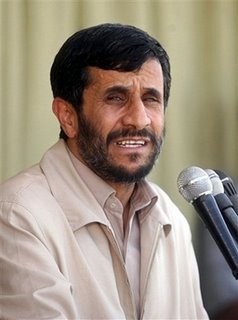Iran Nuclear Crisis: Did the Other Guy Just Blink? Did Israel's Attack on Hezbollah in Lebanon Help?
 It was October 24, 1962, in the middle of the Cuban Missile Crisis. President Kennedy had imposed a naval blockade on Cuba--an act of war. The previous day, U.S. Navy ships had taken position around the quarantine line designated by the President. Now, Soviet ships were approaching that line, and the Navy had orders to use any means necessary to stop and search the ships if they crossed the line. Both nations nuclear attack systems were on a high state of alert. As the world held its breath, the Soviet ships approached just short of the line--and then stopped dead in the water. Secretary of State Dean Rusk famously said, "We were eyeball to eyeball and the other guy just blinked."
It was October 24, 1962, in the middle of the Cuban Missile Crisis. President Kennedy had imposed a naval blockade on Cuba--an act of war. The previous day, U.S. Navy ships had taken position around the quarantine line designated by the President. Now, Soviet ships were approaching that line, and the Navy had orders to use any means necessary to stop and search the ships if they crossed the line. Both nations nuclear attack systems were on a high state of alert. As the world held its breath, the Soviet ships approached just short of the line--and then stopped dead in the water. Secretary of State Dean Rusk famously said, "We were eyeball to eyeball and the other guy just blinked."Today, the Iranian government may have just blinked. As reported here by the Associated Press, Iran announced today that Western incentives to halt its nuclear program were an "acceptable basis" for talks, and it is ready for detailed negotiations.
Obviously, one statement does not mean the end of the crisis or that Iran will actually follow through on any agreement that is negotiated. As the Gipper said, "Trust but verify."
Until today, the Iranians had shown little interest in serious negotiations. Indeed, out of frustration with Iranian recalcitrance, the United States, France, Britain, Russia, China, Germany and the European Union all agreed last Wednesday to submit the issue of Iran's nuclear progran to the UN Security Council, as reported here.
Despite that superficial show of unity, it was doubtful whether Russia or China would have voted for a serious program of sanctions against Iran, and therefore doubtful that Iran would have agreed to negotiate merely because the UN Security Council was taking up the issue. So what turned Iran around?
I would argue that Iran was taken aback by the ferocity of Israel's counter attack against Hezbollah, Iran's proxy in Lebanon in its war against the West. Iranian President Ahmadinejad's policy of confrontation with the United States and Israel was based on his assumption that Israel, having retreated in Lebanon and in Gaza, was a weakened, paper tiger. Suddenly, the tiger turned and showed that it still has fangs, claws and a nasty temper.
Another sign that Iran has blinked: Iran's official news agency, IRNA, denied on Sunday charges by Israel that the missile that damaged an Israeli naval vessel last week was Iranian made and launched with the assistance of Iranian Revolutionary Guards assisting Hezbollah in Lebanon. I don't believe the denial for a minute, but it is intriguing that Iran now denies what two weeks ago it would have been proud to publicize. The conclusion: Iran is now afraid of an armed confrontation with Israel and the United States.
If my conclusion is correct, and Israel's actions against Hezbollah in Lebanon have forced Iran to the negotiating table on its nuclear program, the West owes a debt of gratitude to Israel, and not for the first time.





1 Comments:
Did it blink or just take the time to more sharply hone its claws? I think the later - time, to people who willingly die for Allah, is merely another tool or tactic -don't mistake it for capitulation.
Posted by DL
Post a Comment
<< Home